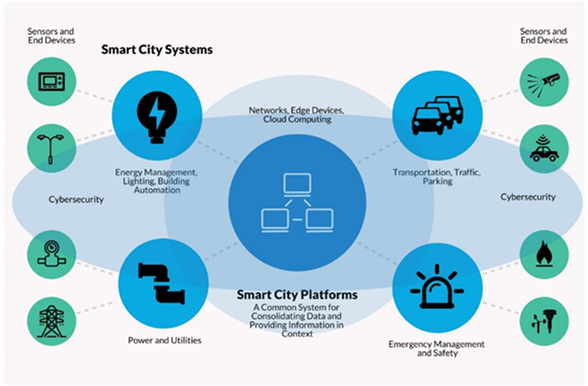

Despite the negative impact of COVID-19 on tax revenue and depressed market conditions in 2020, many cities and governments are finding that smart city platforms are the key to mounting a more effective response to COVID019 and to developing a more resilient infrastructure moving forward. The latest edition of the ARC study forecasts the market for smart city platforms through 2024 and analyzes key growth drivers and headwinds for the marketplace.
Smart city platforms are IoT enabled solutions that allow smart city end users to gain seamless access to data across the multiple siloes of functionality that exist in today’s cities, including applications like transportation management, health and public safety, environmental (including water and wastewater), energy, governance, the built environment, and more. Traditionally, these systems have existed in isolation, with a wide variety of legacy equipment and systems. Smart city platforms provide a single environment for managing data from all of these applications and systems, and more importantly, they have the ability to take the large amounts of data coming from these systems and turn it into actionable information to address specific issues within the city.
Smart city platforms perform many functions. These include analytics, remote asset monitoring, performance management, decision support, and/or presentation components. At its core, the smart city platform should include a common environment for visualization, advanced applications, analytics, and contextualized data. Smart city platforms should also include elements for cybersecurity and may include capabilities to manage devices, systems, and networks. Common APIs and application development tools may also be included as well as other advanced functions such as GIS and location services, advanced reporting, and simulation.

The smart city integrated operations platform marketplace is still in its formative stages. There are many suppliers, from large integrated IT or Telecom companies like Cisco and AT&T to primarily industrial conglomerates like Aveva, Siemens and Schneider Electric, and even service providers like Tata Consultancy Services. Some suppliers have very strong regional businesses like Huawei does in China and other parts of Asia and Africa. ZTE and Inspur are also primarily China Suppliers.
Many smart city projects will be postponed or canceled as a result of COVID-19, but ARC also sees the pandemic as a catalyst for many cities both large and small to reignite their digital transformation initiatives, and in many cases, this leads to the adoption of smart city platforms. The main reason behind this is the need to consolidate and manage data from various sources around the city not only to better deal with COVID-19 but also to provide a more resilient city infrastructure into the future. End users and owner-operators will increasingly look to smart city platform suppliers to provide them with a wider range of services as they continue to deal with workforce challenges and budget shortfalls.
This market study may be purchased as an Excel Workbook and/or as a PDF File. The Workbook has some unique features such as the ability to view data in local currency. You can find out more at our web site here.

